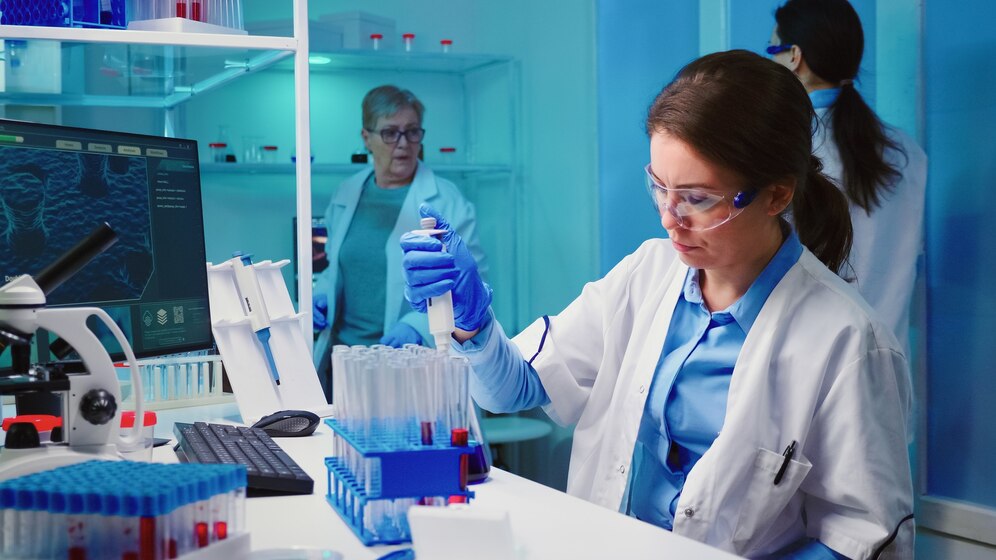The Myths And Challenges Behind The Lives Of Pharmaceutical Scientists
03 November 2023
4 Mins Read

toc impalement
There are several careers that are open enough for the average person to have a rough clue of what the work is like. Popular culture, Hollywood, and the media have given us sufficient context for careers like lawyers, police officers, and doctors. However, there are some fields that rarely get the same sort of media attention.
The people in these fields can almost take on a mysterious air, with no one really knowing what they do. Pharmaceutical scientists are one such example. We may have a vague notion that they work on producing medication, but is that truly it? Is there more to this profession than meets the eye? Let’s find out.
The Common Misconceptions
The first step in understanding what life truly is like for these scientists is dispelling some of the misconceptions that exist. The biggest of these is that pharmaceutical scientists are just “pill makers.” This is a gross oversimplification of their work, which goes far beyond that role.
They are involved in a number of stages, including drug discovery, pre-formulation studies, research, and more. Pharmaceutical scientists also work on a wide range of drug delivery systems, and not just oral medications. It’s possible for some of them to have never touched a pill in their professional lives.
Yes, a part of their role may involve producing “pills”, but their role clearly goes beyond that scope. They are scientists, after all, and as Proprep states, their responsibilities will include a significant amount of research and experimentation.
Another common misconception is that they are all rich, work for big pharmaceutical companies like Pfizer, and earn in the millions. Only a minority end up in such roles. There are countless other fields that hire and make use of pharmaceutical scientists. This includes government agencies, universities, and non-profit organizations.
They may make a good income, but only a tiny minority become multi-millionaires in this field.
An Academically Challenging Path
The journey it takes to become a pharmaceutical scientist is also not simple. You would need to have a solid foundation in chemistry and related fields right from high school. While other students might struggle with questions revolving around ethanol molar mass, you would already be pre-reading topics like pharmacokinetics.
You will have to focus on organic chemistry, biology, microbiology, and similar subjects during your undergraduate and graduate studies. Some may say that you can get by with just a Master’s degree, but you will definitely want to get a Ph.D. A doctorate will often be necessary for those cushy, high-paying jobs that people seem to think are guaranteed in this field.
Even with a doctorate, there are several certifications revolving around clinical research and regulatory bodies that you will be encouraged to pursue. It is very much a “lifelong learning” field, as new discoveries and advancements keep things dynamic.
It’s an intellectually demanding career, but one that does have its benefits. Of course, that’s a topic for another day.

Frequently Asked Questions
1. How much can pharmaceutical scientists really make?
While it obviously depends on location, experience, and other factors, the average salary can range from $79,000 to $99,814. With bonuses and other benefits, income can be as high as $151,000 a year. Some employers, like BASi and Ashland, are known for their competitive salaries of $101,255 and $100,005, respectively.
2. How hard is it to get a job as a pharmaceutical scientist?
Considering that the demand for pharmaceutical scientists is set to grow 17% by 2028, the job market looks good. Some of the biggest employers in the U.S. are Novitium Pharma LLC and Allergan Sales, LLC.
3. Is it true that pharmacists earn more than pharmaceutical scientists? If so, why?
Yes, it is true. While pharmaceutical scientists’ earnings seem to cap out at $100,000 without bonuses, pharmacists can earn as much as $160,000. This is mainly due to the fact that pharmacists have to interact and deal with patients in a more direct manner.
Their training also reflects this, as they are required to have rigorous knowledge of regulatory compliance and understand the safe administration of medication.
Conclusion
Pharmaceutical scientists have a tougher life than most people expect. When you are part of the industry that manufactures or deals with life-improving drugs, stress is part of life. Regardless of public opinion, these scientists contribute to the well-being of humanity. If some of them are paid handsomely, well, that should be the least of our worries.
Read Also:


















Comments Are Closed For This Article